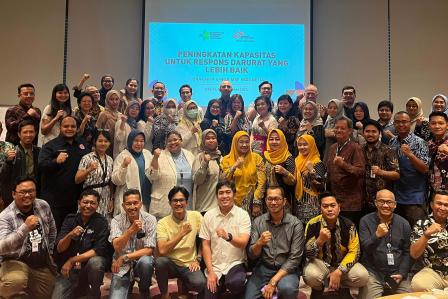Indonesia: Doctors Without Borders’ Emergency Preparedness Training for Healthcare Workers in Aceh Province
A Mental Health and Psychosocial Support (MHPSS) trainer discusses the impact of disasters on mental well-being. © A Putera Pratama Mangewa/MSF
It is crucial for healthcare professionals in Indonesia to be prepared for emergencies due to the country's susceptibility to natural disasters such as earthquakes, floods and landslides, as well as man-made or social disasters such as fires or large-scale accidents. Indonesia is positioned on the Ring of Fire and frequently experiences events that can lead to significant health crises, overwhelming local health capacity. Preparedness ensures that healthcare professionals can effectively respond to emergencies, minimising casualties and disruptions to health services. This readiness is vital for saving lives, maintaining public health, and ensuring a swift recovery in disaster-affected areas.
Doctors Without Borders / Médecins Sans Frontières (MSF) has continued its commitment in Indonesia by collaborating with the Health Crisis Center of Ministry of Health (MoH) to implement the Emergency Hub (E-Hub) project for Capacity Building. This project aims to create educational opportunities for health crisis and disaster responders, thereby improving their capacity to deliver high-quality responses. When it was launched in 2023, the basic training covered DKI Jakarta and Banten but now from 2024 until 2026, MSF has planned to deliver training in Aceh, West Sulawesi and Maluku. These provinces were selected based on Indonesia's priority index for disaster-prone areas with limited human resource capacity in health crisis response.
Collaboration for Resilience
The Ministry of Health is currently implementing a health transformation initiative, with one of its pillars being a resilient health system. The aim is to create a robust health system capable of mitigating, preparing for and responding to health emergencies at both the national and regional levels.
A strategic target within the disaster management system is to reduce disaster risks by enhancing capacity and preparing competent human resources. To achieve this, the Ministry of Health has launched the Healthcare Reserve Workforce program, which includes training medical, health and non-health personnel to be ready before a health crisis occurs. These trained individuals can then be mobilised effectively.
Doctors Without Borders Indonesia, through its Memorandum of understanding (MOU) with the Health Crisis Center, is enhancing the capacity of health professionals from the provincial and district levels to respond effectively to disasters. This collaboration aims to strengthen health personnel's ability to respond quickly, accurately and effectively to health crises, thereby reducing mortality and morbidity. Ultimately, the implementation of this activity is also part of efforts to support health transformation and to enhance preparedness and strengthen health resilience.
Doctors Without Borders' Work in Aceh
In June, the Doctors Without Borders Indonesia team conducted two batches of basic training in Aceh Province with the support of the Crisis Center, Environment Health, and the Mental Health Directorates of the Ministry of Health. These two batches of E-Hub Capacity Building training were successfully conducted in Banda Aceh City, covering four critical emergencies skills previously applied in Banten and DKI Jakarta, including training in Medical Emergency Services, Mental Health and Psychosocial Support, Environmental Health, and Basic Geographic Information System (GIS) and Data Management in emergencies. The training sessions were held in the form of eight classes in four separate venues to accommodate all participants, with 235 participants from 17 districts attending three days of training in each batch.
Doctors Without Borders delivered the training with both internal trainers and external facilitators from various organisations, including the Health Crisis Center, Directorate of Mental Health, and Directorate of Environmental Health of MoH, Provincial Health Office (PHO) Aceh’s Crisis Center, Mental Health and Enviromental divisions, Indonesia Doctor Association, Indonesia Red Cross, and Muhammadiyah Disaster Management Centre (MDMC) from Aceh branches. Additionally, an online facilitator from Doctors Without Borders' Kutupalong Hospital in Bangladesh demonstrated waste management in a health facility. The training employed diverse methods such as lectures, discussions, group discussions, brainstorming, role-plays, demonstrations and simulations, ensuring active participation from all attendees.
Participants combine base maps with institutional data to create insightful visualizations, revealing the distribution of key information for comprehensive disease surveillance. © Rizki Aulianisa/MSF
Feedback from Participants
Azri, a nurse in the Mental Health Services Department at Cut Meutia General Hospital in North Aceh district, participated in the E-Hub MHPSS (Mental Health and Psychosocial Support) training.
"Although I work in mental health services daily, MHPSS knowledge is new to me. With participants from disaster-affected health offices and clinics, we might form an inter-regional team in the future. My impression of the training is very positive. The instructors were enthusiastic, and the material was easy to understand and relevant. I appreciated the balance between theory and practice provided."
He hopes such training sessions can be held more frequently. While they are expected to share their knowledge with colleagues post-training, given that Aceh is disaster-prone, it is crucial to continue organising this valuable training.
Participants present the results of their Follow-Up Plans, showcasing the referral system in their respective areas. These presentations highlight their commitment to improving healthcare coordination and accessibility, ensuring that patients receive timely and efficient care during emergencies. The activity fosters an exchange of innovative ideas and best practices, aiming to strengthen healthcare networks and response strategies. © Rizki Aulianisa/MSF
Meanwhile, another participant, Dr Maya Safina, from the Health Quarantine Center (Balai Kekarantinaan Kesehatan or BKK) in Banda Aceh, who participated in the E-Hub Disaster Health Services training, remarked, "This experience has been incredible. It is the first time I have received additional knowledge in emergency response and disaster triage. Our medical skills at BKK are not the same as those at a regular hospital, and this training has helped us better prepare for emergency situations."
